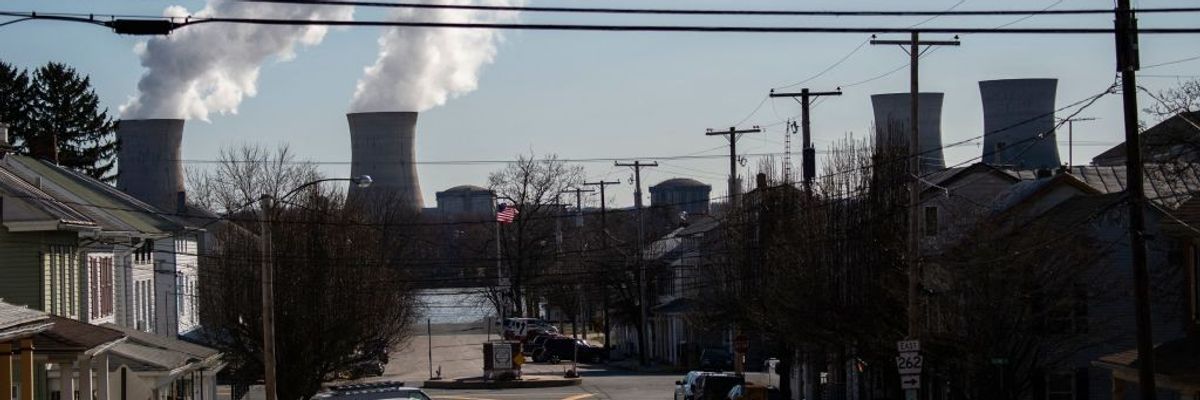The corporation that owns the shuttered nuclear plant on Three Mile Island on Friday announced a deal with Microsoft to reopen the facility to provide power to the tech company for data centers using artificial intelligence.
Three Mile Island is well-known as the site of largest nuclear disaster in U.S. history—a reactor there, Unit 2, partially melted down in 1979. However, the site's other reactor, Unit 1, continued to operate safely until 2019, when it was closed for economic reasons.
With the help of tax breaks from the Inflation Reduction Act (IRA), plant owner Constellation Energy plans to spend $1.6 billion to restart Unit 1, with all of the power going to Microsoft for the first 20 years. Microsoft and other tech firms use inordinate amounts of energy to power data centers used for AI and have advocated for nuclear as a zero-emissions power source.
Though it doesn't emit carbon, nuclear power's downsides make it the subject of fierce opposition from many environmental and public safety groups.
Friday's deal, combining nuclear power and AI, which also poses great safety risks, was too much for The Philadelphia Inquirer columnist Will Bunch, who quipped that "the hellscape of modern life" had been captured in one headline.
Local campaigners vowed to push against the reopening and keep the area free of nuclear activity.
"We will challenge this proposal at every venue that is available for us," Eric Epstein, a former chairman of Three Mile Island Alert, a campaign group, told the Inquirer.
"This is another chapter in a nightmare that won't end," he added.
Three Mile Island would be the first decommissioned U.S. nuclear plant to reopen, and the first to provide all of its power to one corporation, according toThe New York Times. Microsoft and Constellation didn't disclose the financial details of the deal.
About 19% of electricity in the U.S. comes from nuclear power, and a drive for "clean energy," as well as the IRA credits, have spurred growth in the sector. Microsoft co-founder and former CEO Bill Gates is a vocal proponent and has started his own nuclear company, TerraPower, which is building a plant in Wyoming.
The Three Mile Island project, expected to get the plant back online in 2028, still needs regulatory approval at multiple levels. Pennsylvania Gov. Josh Shapiro, a Democrat, has already come out in support of the plan.
A study commissioned by the Pennsylvania Building & Construction Trades Council, which represents more than 115 local unions, found that reopening the plant would create 3,400 direct and indirect jobs, including 600 at the plant itself, which is in the middle of the Susquehanna River, just south of Harrisburg, the state capital. The plant's reopening is seen by some community leaders as the revival of an "economic anchor in a region beset with financial hardship," according toThe Washington Post.
Pennsylvania has five active nuclear plants, including two owned by Constellation, whose stock price shot up on Friday morning after the Three Mile Island announcement was made. The company and other industry backers celebrated the symbolic victory of restarting the plant.
"If anything says nuclear power is here to stay and expand, it's Three Mile Island reopening!" Amir Adnani, CEO of Uranium Energy Corp, wrote on social media.
Epstein, the campaigner, said the focus should be finishing the cleanup from the 1979 disaster. About 99% of the Unit 2's fuel has been removed to Idaho, but the last 1% has proven difficult to deal with.
"First things first, remove the waste from the island, and clean up [Unit 2]," Epstein said.
